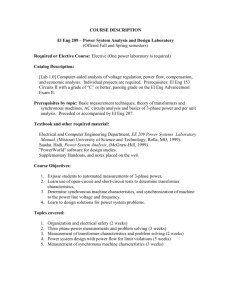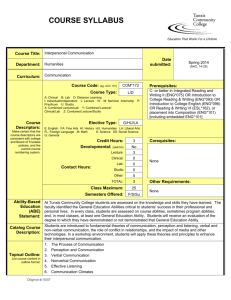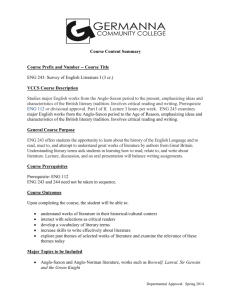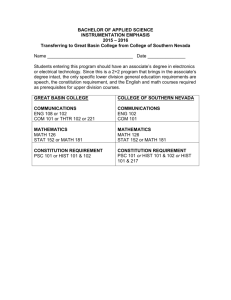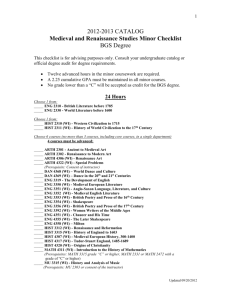The University's Bachelor of General Studies (BGS)
advertisement
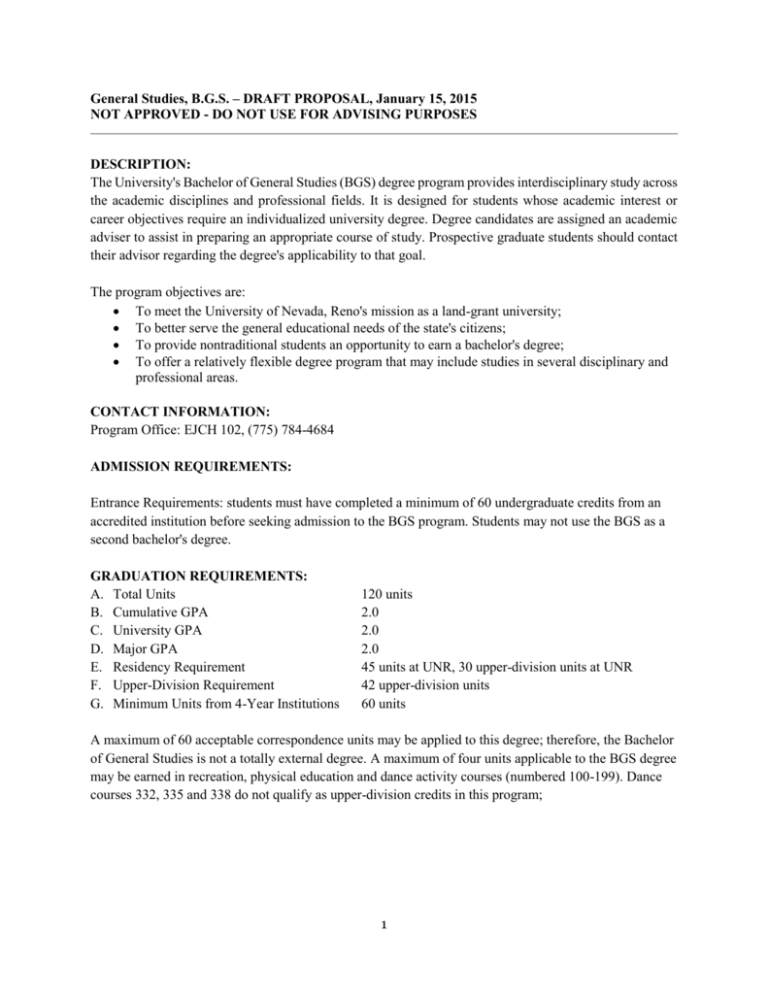
General Studies, B.G.S. – DRAFT PROPOSAL, January 15, 2015 NOT APPROVED - DO NOT USE FOR ADVISING PURPOSES DESCRIPTION: The University's Bachelor of General Studies (BGS) degree program provides interdisciplinary study across the academic disciplines and professional fields. It is designed for students whose academic interest or career objectives require an individualized university degree. Degree candidates are assigned an academic adviser to assist in preparing an appropriate course of study. Prospective graduate students should contact their advisor regarding the degree's applicability to that goal. The program objectives are: To meet the University of Nevada, Reno's mission as a land-grant university; To better serve the general educational needs of the state's citizens; To provide nontraditional students an opportunity to earn a bachelor's degree; To offer a relatively flexible degree program that may include studies in several disciplinary and professional areas. CONTACT INFORMATION: Program Office: EJCH 102, (775) 784-4684 ADMISSION REQUIREMENTS: Entrance Requirements: students must have completed a minimum of 60 undergraduate credits from an accredited institution before seeking admission to the BGS program. Students may not use the BGS as a second bachelor's degree. GRADUATION REQUIREMENTS: A. Total Units B. Cumulative GPA C. University GPA D. Major GPA E. Residency Requirement F. Upper-Division Requirement G. Minimum Units from 4-Year Institutions 120 units 2.0 2.0 2.0 45 units at UNR, 30 upper-division units at UNR 42 upper-division units 60 units A maximum of 60 acceptable correspondence units may be applied to this degree; therefore, the Bachelor of General Studies is not a totally external degree. A maximum of four units applicable to the BGS degree may be earned in recreation, physical education and dance activity courses (numbered 100-199). Dance courses 332, 335 and 338 do not qualify as upper-division credits in this program; 1 COURSE REQUIREMENTS: Students this major must meet all Silver Core Objectives (CO1 through CO14). Courses satisfying Core Objectives are designated (e.g., CO9) in General Catalog curricula and course descriptions. I. University General Education Requirements (24-33 units) A. Silver Core Writing and Prerequisite (3-8 units): – CO1, CO3 1. ENG 101 - Composition I (3 units) OR ENG 100J – Composition Studio (5 units) 2. ENG 102 - Composition II (3 units) NOTE: Students who place in ENG 102 are not required to complete ENG 101 or ENG 100J. B. Silver Core Mathematics (3-5 units) – CO2 Refer to the Core Curriculum chapter in this catalog. C. Silver Core Natural Sciences (6-8 units) – CO4 Refer to the Core Curriculum chapter in this catalog. D. Silver Core Social Sciences (3 units) – CO6 Refer to the Core Curriculum chapter in this catalog. E. Silver Core Fine Arts (3 units) – CO7 Refer to the Core Curriculum chapter in this catalog. F. Silver Core Humanities (6 units). Select two: CH 201 – Ancient & Medieval World (3 units) – CO5 CH 202 – The Modern World (3 units) – CO5 CH 203 – The American Experience & Constitution (3 units) – CO5, CO8 NOTE: Students who do not complete CH 203 must take a course that satisfies CO8 elsewhere in the curriculum. II. Additional Silver Core Requirements (0-18 units) Students must take courses that satisfy the following Core Objectives. Some or all of these requirements may be satisfied by courses in the major requirements. Refer to the Core Curriculum chapter in this catalog. A. Science, Technology & Society Course – CO9 B. Diversity & Equity Course – CO10 C. Global Context Course – CO11 2 D. Ethics Course – CO12 E. Capstone Integration & Synthesis Course – CO13 F. Application Course – CO14 III. General Studies Requirements (60-63 units) A. Additional Composition and Communication Requirements (6-9 units) Choose three courses from the following: IS 101 - Introduction to Information Systems (3 units) IS 201 - Computer Applications (3 units) CS 105 - Introduction To Computing (3 units) CS 135 - Computer Science I (3 units) CS 202 - Computer Science II (3 units) CPE 201 - Digital Design (3 units) ENG 101 - Composition I (units included in General Education requirements) ENG 321 - Expository Writing (3 units) Foreign languages numbered 111-212 (3-4 units each) Any lower division COM courses, with the exception of COM 216. B. Additional Natural Science Requirements (3 units) Choose from courses listed in the “Natural Sciences” section of the Core Curriculum chapter in this catalog. Courses used to satisfy the Silver Core Curriculum General Education requirement may not be reused here. C. Additional Social Science Requirements (6 units) Choose from either: 1) courses listed in the “Social Sciences” section of the Core Curriculum chapter in this catalog; 2) any 100-200 level political science, psychology, or sociology course; 3) any 100200 level history course with the exception of HIST 105, HIST 106 or HIST 282; or 4) any course in the following list. Courses used to satisfy the Silver Core Curriculum General Education requirement may not be reused here. CRJ 101 - Introduction to Criminal Justice I (3 units) CRJ 102 - Introduction to Criminal Justice II (3 units) JOUR 101 - Critical Analysis of Mass Media (3 units) SW 101 - Intro Social Work (3 units) D. Additional Humanities or Fine Arts Requirement (3 units) Choose from either: 1) courses listed in the “Fine Arts” section of the Core Curriculum chapter in this catalog; or 2) any course in the following list. Courses used to satisfy the Silver Core Curriculum General Education requirement may not be reused here. ENG 223 - Themes of Literature (3 units) ENG 252 - Introduction to Drama (3 units) ENG 261 - Introduction to Poetry (2 to 3 units) ENG 265 - Nature in Literature (3 units) ENG 266 - Popular Literature (3 units) 3 ENG 271 - Introduction to Shakespeare (3 units) ENG 281 - Introduction to Language (3 units) ENG 282 - Introduction to Language and Literary Expression (3 units) ENG 297 - Reading and Interpreting (3 units) ENG 298 - Writing About Literature (3 units) FREN 221 - France and Its Culture (3 units) – CO11 GER 221 - German Culture (3 units) – CO11 HIST 105 - European Civilization (3 units) HIST 106 - European Civilization (3 units) ITAL 221 - Italy and Its Culture (3 units) – CO11 ITAL 223 - Italian Literature in English Translation (3 units) HIST 347 - History of Mexico (3 units) JPN 221 - Japan and Its Culture (3 units) – CO11 RST 101 - Introduction to Religious Studies (3 units) SPAN 221 - Iberia and Its Cultures (3 units) – CO11 SPAN 222 - Hispanic-America and Its Culture (3 units) Any 100- or 200-level Philosophy course E. Breadth Requirement (12 units) Complete 12 units outside the College of Liberal Arts and the departments of Biology, Chemistry, Geography, Mathematics and Statistics, or Physics. Use of upper-division and PEX courses to fulfill this requirement must be approved by the General Studies advisor. F. Cluster Specialization (30 units) Students must complete a 30-unit cluster of thematically-related coursework. Eighteen of the 30 units must be 300-400 level. The cluster must cross three departments or two colleges. A maximum of 9 units from each minor may be included in the thematic cluster. The student will design the cluster and may use courses already completed. The cluster form must be received by the advisor two semesters prior to graduation. IV. Minor Requirements (0 units) A minor is encouraged but not required for the Bachelor of General Studies. However, students in the General Studies program may not declare more than two minors. V. Electives (6-36 units) 4
